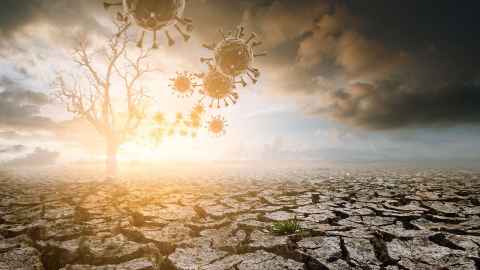Anne Salmond: Life after the Pandemic
17 June 2020
Opinion: “There’s a sense that the ground beneath us is lurching,” writes Dame Anne Salmond. New Zealand’s team of five million must play the game of their lives.

Around the world, millions of people are still in lockdown, trying to avoid the worst consequences of a global pandemic. It’s been a shocking, bizarre time, with people locked in their houses, unable to go to work (except online) or visit many of their nearest and dearest, even in the extremity of illness or death.
In Aotearoa New Zealand, the suspension of life as usual has been short compared with many other countries, and the loss of life blessedly limited. Nevertheless, the suffering elsewhere means life in our country has fundamentally shifted, with rigidly controlled borders limiting access to friends, family and colleagues overseas, and the risk of a second wave of the virus always in mind.
As Bruno Latour, the French philosopher, has noted, during lockdown we learned a great deal about the ubiquity and fragility of global networks of people, goods and services, and about exponential growth. We’ve seen how a thought or a virus can fly around the world, ignoring national borders, and picking up pace as it goes – the climate change protests or ‘Black Lives Matter,’ or Covid-19, for instance.
In our small, relatively close-knit island nation, over the past few months ‘the team of five million’ has been galvanised by the pandemic to work towards common goals. Fortunately, the idea that the lives of friends or family should be sacrificed for ‘the economy’ had very little traction in New Zealand, and the risks posed by self-serving individuals to others became stark.
During lockdown, while many of us found consolation in the kindness of neighbours, time to reflect and enjoy the beauty of our country, some of us died, others got sick and many others are frightened and have lost or are losing their jobs.
There’s a sense that the ground beneath us is lurching. The global economy is fragile, with the climate crisis, mass extinctions and collapsing ecosystems looming like black clouds on the horizon. Around the world, leaders are being tested, perhaps as never before, and some are failing in spectacular style.
In New Zealand, we’ve been lucky. With the support of most people, our leaders took this small, remote country through months of isolation and sacrifice to eliminate Covid-19, at least for now. Now with an election also looming, the temptation to engage in pork-barrel politics and adopt short-term fixes is alluring, at least for some. For the rest of us, that’s dangerous.
As many commentators have observed, in many ways, Covid-19 is the least of our worries. After decades of fostering radical inequalities, and ravaging soils, rivers, forests and harbours in the name of profit, our life support systems are faltering, and the links that bind us together are being corroded. If our leaders fail to tackle these challenges head on, they will put the lives of their own children and grandchildren at risk.
At present, the government is proposing unprecedented investments in infrastructural projects, Jobs for Nature, and other support for workers and businesses. The Post-Covid transition must be just, astute and ecologically smart, or these investments will backfire.
In lockdown, the cynicism of ‘trickle down’ economics became obvious. Many ‘essential workers’ who are poorly paid but perform vital services put their lives at risk for little reward; while many affluent individuals and businesses took government subsidies to protect their balance sheets.
In the interests of social cohesion, it’s vital that those who will be hardest hit by the aftermath of the pandemic – Māori, Pasifika, women, those in particular regions and industries, are supported by these investments, and that those who are already wealthy and secure don’t capture most of the benefits.
It is vital, too, that these investments effectively address environmental destruction - rivers choked with sediment and polluted with nitrates; native forests being chewed to death; rising seas and drowning islands. Regenerative approaches to agriculture, forestry, tourism and urban planning are imperative. Young people, at least, understand the existential risks we’re running – witness the climate change protests before lockdown.
In his forthcoming book, Hope in Hell, Sir Jonathon Porritt offers an authoritative summary of the science on these matters, and gives us a decade to rescue a habitable planet for humanity. Just as we listened to the scientists on Covid-19, we must listen to them even more carefully about the fundamental risks the human species is facing.
There will be the greedy, the selfish and the cynical who try to dispute scientific findings to advance their own interests; but during the pandemic, at least, the rest of us recognised them for who they are, and told them to pull their heads in.
In light of a global surge of revulsion against racism and inequality driven by the death of George Floyd, and protests fuelled by a sense of inter-generational injustice over climate change, the case for a just, ecologically transformative recovery is compelling.
It is my hope and belief that the same collective good sense and astute leadership that helped us get through the pandemic (so far) will shape our future in New Zealand. In the aftermath of Covid-19, its time for the team of five million (literally) to play the game of their lives.
Dame Anne Salmond is a Distinguished Professor in the Faculty of Arts and 2013 New Zealander of the Year.
This article reflects the opinion of the author and not necessarily the views of the University of Auckland.
Used with permission from Newsroom Anne Salmond: Life after the Pandemic 17 June 2020.
Media queries
Alison Sims | Research Communications Editor
DDI 09 923 4953
Mob 021 249 0089
Email alison.sims@auckland.ac.nz